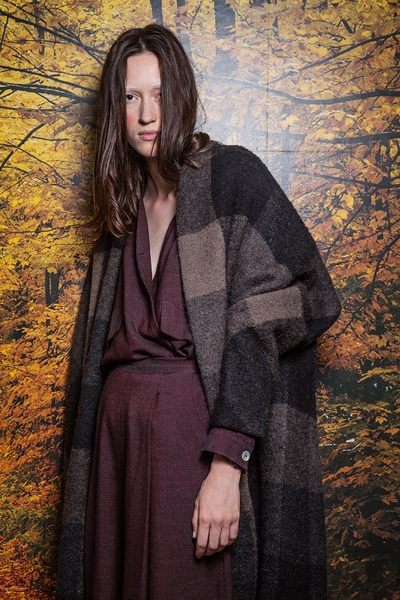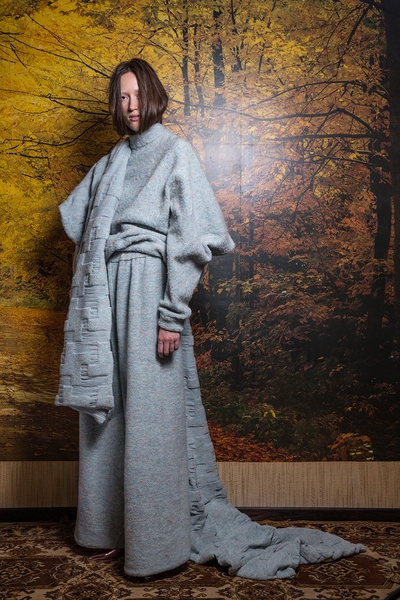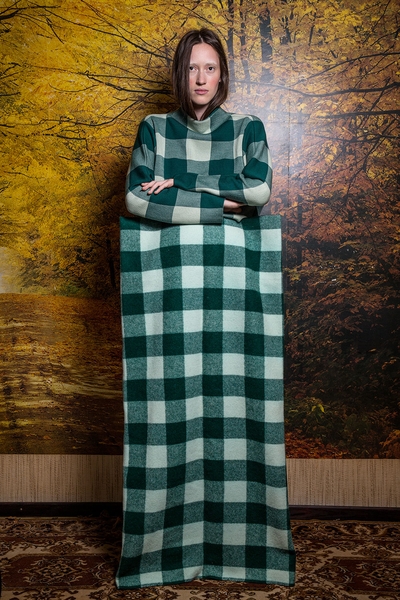Jana Wieland / Michael Amherst
Women's wear
Jana Wieland / Michael Amherst
The Woodcutter´s Daughter read by Christoph Dostal
Designer
Jana Wieland
Jana Wieland is a fashion designer from Austria. Many of her pieces are made from heavy blanket-like knit fabrics – mohair yarns, dupion silk and cotton – resulting in bold and robust silhouettes which nonetheless gently envelop the female body with elegance as well as protection. Dark earthy hues instil the garments with a sense of calm and bring to mind the mysteries of our external and internal worlds. Her approach to shape is haptic and highlights the interconnectedness of body, movement and clothing. One of the defining features of Wieland’s collections ‘Strange Pie’ and ‘Suchness’ lies in the buoyancy, firmness and simplicity of her designs which playfully complement the nature of the dense organic materials employed. Born in 1990, Wieland is an up and coming designer living and working in Vienna. She recently completed her BA in Fashion at the University of Arts and Industrial Design in Linz /Vienna, during which she was awarded the prize for most interesting artistic accomplishment of bachelor fashion design program in 2013. In 2014 Wieland was also nominated for the Austrian Councils Fashion Award by a jury of international fashion heavy-hitters. Wieland’s work has been featured in, amongst others, Vogue.it Online, Nasty Magazine and dossier journal.
Author
Micheal Amherst
Born in Cheltenham in 1983, Amherst studied English at Oxford, where he was awarded an academic scholarship, and later gained an MA in Creative Writing from the University of East Anglia. He is a writer of fiction and non-fiction and his work has been published internationally, including in the Guardian, New Statesman, the Spectator, The White Review and Contrappasso magazine. He was short-listed for the 2012 Bridport Prize and long-listed for the 2014 BBC Opening Lines. Amherst is also a Director of Just Detention International, an organisation campaigning against sexual violence in prisons across the globe, and in 2012 he was appointed to the Howard League’s Independent Commission on Sex in Prisons.

The fire was out and the snow was falling but still the woodcutter did not get up. His back was bad.
‘It’s the old trouble and a new trouble,’ the doctor said. But beyond that he offered no remedy. The old man lay and fidgeted, his face grey with guilt at his tiredness. Chill, austere winds had blown in from the north, choking great tracks of land so there was no harvest to speak of and many of the animals had died. On the edge of the wood, great army trucks moved to disperse those looking for work.
At night the daughter could hear her father’s sobs. They carried from the fireplace downstairs, next to where his bed lay, up the chimney and into her room.
She sent the forms the doctor had given them applying for government money but they were returned: ‘SELF EMPLOYED’ scrawled in red ink at the top of each page. The daughter told her father she would try – she would try and go out to the wood and cut the trees broken or felled by the winds.
‘You must leave the younger trees,’ he told her. ‘So many of the younger ones will have been broken in these winds but you must wait for them to dry out before we can do anything with them.’
But instead, when out walking, she picked up thin, traced leaf skeletons along with those brightly coloured leaves, only recently fallen, and gathered them together in the hem of her coat. In the evening she sat by the warmth of the fire and knitted them together with long, thin, ivy threads. Her father watched but did not ask what she was doing as he’d learnt not to question the ways of others. ‘Work is work,’ he would say, ‘and its value is no more determined by others’ understanding of it than a price can be put upon the sun.’
When she’d finished he saw that she had made garments of various colours and textures – some glossy and smooth as stone, others delicate and papery. She took them into town and asked that they be sent to the rich cities of the north. Over the following days as they waited to hear from the northern cities and capitals she continued to work, gathering by day, sewing by night. But one night, while sat by the fireside, the tiredness overwhelmed her, her head bowed to her breast and the hem of one of the dresses caught in the flickering light. The little house was razed to the ground: a candle flame aglow in the midst of the dark.


